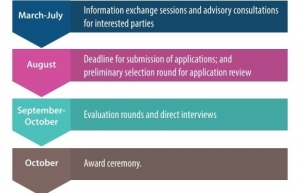ASEAN employers tend to prioritise AI-skilled talent
Amazon Web Services (AWS), an amazon.com company, released new research on April 2 showing that employers across ASEAN are willing to pay higher salaries of over 36 per cent for workers with AI skills and expertise, with workers in IT (49 per cent), and research and development (46 per cent) enjoying the highest pay bumps.
The regional study, titled “Accelerating AI Skills: Preparing the Asia-Pacific Workforce for Jobs of the Future” surveyed almost 6,700 workers and over 2,000 employers across ASEAN.
 |
On top of significant salary bumps, 97 per cent of ASEAN workers expect their AI skills to have a positive impact on their careers, including increased efficiency, higher job satisfaction, and faster career progression. 92 per cent of ASEAN workers indicated an interest in developing AI skills to accelerate their careers, and this interest transcends generations.
Over nine in 10 Gen Z (93 per cent), Millennial (93 per cent), and Gen X (90 per cent) workers want to acquire AI skills, while 86 per cent of Baby Boomers–a demographic usually contemplating retirement–say they would enrol in an AI upskilling course if it was offered.
The research also found that the productivity payoff from an AI-skilled workforce could be immense for the ASEAN region. Surveyed employers expect their organisation’s productivity to increase by 54 per cent as AI technology automates repetitive tasks (69 per cent), improves workflow and outcomes (68 per cent), and enhances communication (64 per cent). ASEAN workers believe AI could raise their productivity by as much as 54 per cent too.
ASEAN organisations go all-in on AI
The speed of AI transformation happening across the ASEAN region is remarkable. 97 per cent of employers envision their companies becoming AI-driven by 2028. While most employers (96 per cent) believe their IT department will be the biggest beneficiary, they also foresee research and development (94 per cent), finance (93 per cent), sales and marketing (92 per cent), human resources (87 per cent), and legal (81 per cent) driving significant value from AI too.
Delving into key industries in the ASEAN region, the research shows the banking and financial services industry is leading the charge on AI adoption, with 97 per cent of organisations using AI solutions and tools today, followed closely by the telecommunications industry (96 per cent), and the public sector (92 per cent).
“The AI wave is sweeping across ASEAN countries, transforming the way businesses operate and the way we work. Our research shows that society as a whole will benefit from an increased productivity boost, which will translate into higher salaries for skilled workers across the region,” said Abhineet Kaul, director at Access Partnership which was commissioned by AWS to conduct the regional study. “With a growing number of organisations expected to deepen their use of AI solutions and tools, and the continual evolution of AI-driven innovations, there is a need for employers and governments to nurture a proficient workforce capable of steering current and future AI advancements.”
Generative AI–a type of AI that can create new content and ideas quickly, including conversations, stories, images, videos, music, and more–has captured the attention of the public in the past year, and this technology is already transforming workplaces across ASEAN. Over 97 per cent of surveyed employers and workers expect to use generative AI tools on the job within the next five years, with 76 per cent of employers highlighting ‘increasing innovation and creativity’ as the top benefit, followed by automating repetitive tasks (66 per cent), and improving outcomes (64 per cent).
 |
| Emmanuel Pillai, head of training and certification, ASEAN, AWS |
“Generative AI offers an unprecedented opportunity to transform businesses across all ASEAN countries, including Vietnam, and this research shows that AI skills are imperative for the future workforce. From financial services to construction and retail, industries are embracing AI at a rapid pace, which is why an AI-skilled workforce is essential to unleashing a culture of innovation and driving productivity in the region,” said Emmanuel Pillai, head of training and certification, ASEAN, AWS. “At AWS, we are collaborating with organisations like VPBank and NAB Innovation Centre Vietnam to upskill their employees so they can effectively manage and embrace emerging technologies, including AI.”
Bridging the ASEAN AI skills gap
The research reveals a looming AI skills gap which must be bridged to ensure the region is well-positioned to unlock the full productivity benefits of AI. Hiring AI-skilled talent is a priority for nine in ten (90 per cent) ASEAN employers, of which nearly 72 per cent cannot find the AI talent they need. The research also uncovers a training awareness gap, whereby over 81 per cent of employers indicated that they don’t know how to run an AI workforce training programme. Meanwhile, 73 per cent of workers said they are not sure about relevant career paths where AI skills are useful.
The research highlights the need for greater collaboration between governments, industries, and educators to help employers across ASEAN implement AI training and guide workers in matching their AI skill sets to the right roles to harness their newly acquired capabilities.
“This report affirms the power of AI as a driver of business transformation. As businesses continue to harness the power of AI to revolutionise the workplace and as the technology becomes increasingly integrated in our everyday lives, governments have an opportunity to steer progress through smart, forward-looking policies that positively impact the role that AI will play in shaping our shared future,” said Jeff Paine, managing director, Asia Internet Coalition.
“In today's rapidly evolving digital landscape, upskilling workers in AI, founded on ethical frameworks and principles, is not just a strategic choice, but a critical imperative for governments and organisations across Asia-Pacific,” said Dr Rupa Chanda, director of the trade, investment, and innovation division at the United Nations Economic and Social Commission for Asia and the Pacific. “This report shows that the future of work demands a workforce equipped with AI proficiency to navigate emerging challenges and harness opportunities for sustainable and equitable economic growth and development, as well as inclusive innovation.”
Accelerating digital skills training across ASEAN
AWS has trained over 50,000 individuals in Vietnam and more than 1.2 million people across ASEAN on cloud skills since 2017. But with the rapid adoption of cloud-enabled technologies like AI, more needs to be done to upskill the workforce at scale so organisations can innovate and grow in an AI-dominated future.
In November 2023, Amazon launched the ‘AI Ready’ initiative that complements AWS’ commitment to provide free cloud computing skills training to 29 million individuals globally by 2025.
 | Microsoft hires DeepMind co-founder to lead AI unit DeepMind co-founder Mustafa Suleyman will become the head of a newly created consumer AI unit at Microsoft, the scientist and entrepreneur said on Tuesday. |
 | Vietnam eyes comprehensive ecosystem for AI technology Tech companies are facing huge opportunities to develop AI and semiconductors with the support of the government and authorities. |
 | Influence of AI technology can reshape labour market The employment market is anticipated to experience disruptions as AI technology becomes increasingly adopted by businesses for intelligent, sustainable management and operations. |
What the stars mean:
★ Poor ★ ★ Promising ★★★ Good ★★★★ Very good ★★★★★ Exceptional
Themes: Digital Transformation
- PM sets five key tasks to accelerate sci-tech development
- Ho Chi Minh City launches plan for innovation and digital transformation
- Dassault Systèmes and Nvidia to build platform powering virtual twins
- Sci-tech sector sees January revenue growth of 23 per cent
- Advanced semiconductor testing and packaging plant to become operational in 2027
Related Contents
Latest News
More News
- PM sets five key tasks to accelerate sci-tech development (February 26, 2026 | 08:00)
- Canada trade minister to visit Vietnam and Singapore (February 09, 2026 | 17:37)
- New tax incentives to benefit startups and SMEs (February 09, 2026 | 17:27)
- Vietnam forest protection initiative launched (February 07, 2026 | 09:00)
- China buys $1.5bn of Vietnam farm produce in early 2026 (February 06, 2026 | 20:00)
- Vietnam-South Africa strategic partnership boosts business links (February 06, 2026 | 13:28)
- Mondelez Kinh Do renews the spirit of togetherness (February 06, 2026 | 09:35)
- Seafood exports rise in January (February 05, 2026 | 17:31)
- Accelerating digitalisation of air traffic services in Vietnam (February 05, 2026 | 17:30)
- Ekko raises $4.2 million to improve employee retention and financial wellbeing (February 05, 2026 | 17:28)

 Tag:
Tag:
























 Mobile Version
Mobile Version